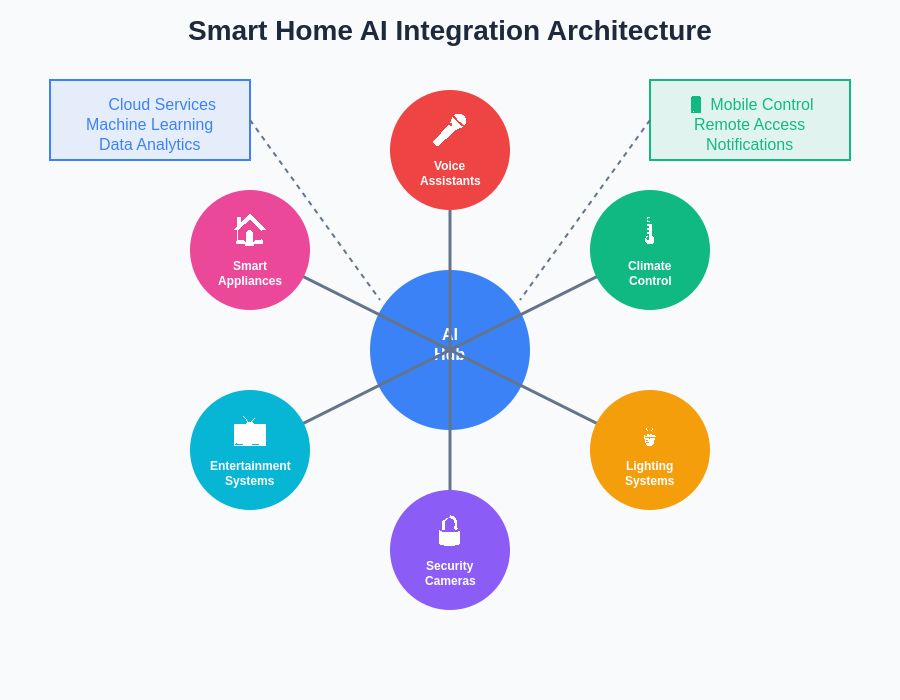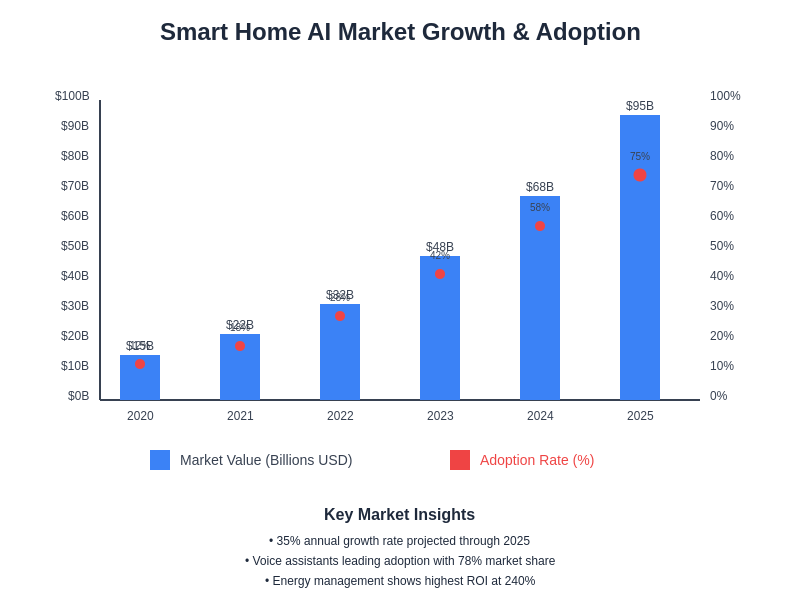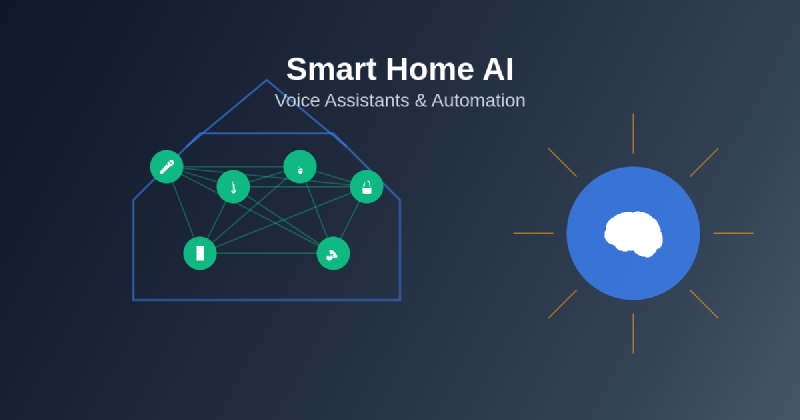The modern home has evolved into a sophisticated ecosystem where artificial intelligence seamlessly orchestrates daily routines, anticipates needs, and creates environments that adapt to human preferences with unprecedented precision. Smart home AI represents a convergence of voice recognition technology, machine learning algorithms, and Internet of Things connectivity that transforms ordinary living spaces into intelligent environments capable of learning, responding, and evolving alongside their inhabitants.
Explore the latest AI innovations in smart home technology to stay informed about cutting-edge developments that are reshaping how we interact with our living environments. The integration of AI into home automation represents more than technological advancement; it signifies a fundamental shift toward homes that understand, anticipate, and respond to human needs with remarkable sophistication and intuitive interaction.
The Foundation of Intelligent Home Ecosystems
Smart home AI operates on a foundation of interconnected devices, sensors, and processing units that collectively create an intelligent network capable of monitoring, analyzing, and responding to various environmental conditions and user behaviors. This comprehensive system relies on sophisticated machine learning algorithms that continuously process data from multiple sources, including voice commands, motion sensors, temperature monitors, lighting systems, and security cameras, to build detailed profiles of household patterns and preferences.
The architecture of modern smart home systems incorporates edge computing capabilities that enable real-time processing and decision-making without requiring constant internet connectivity. This distributed intelligence ensures that critical automation functions continue operating even during network disruptions while maintaining privacy by processing sensitive data locally rather than transmitting it to remote servers.
Advanced neural networks within these systems analyze temporal patterns, seasonal variations, and individual user preferences to create predictive models that anticipate needs before they are explicitly expressed. These AI-driven insights enable homes to automatically adjust climate control settings, optimize lighting schedules, manage energy consumption, and enhance security protocols based on learned behavioral patterns and environmental conditions.
Voice Assistant Revolution in Home Control
Voice assistants have emerged as the primary interface between humans and intelligent home systems, revolutionizing how residents interact with their living environments through natural language processing and conversational AI. These sophisticated systems utilize advanced speech recognition algorithms, natural language understanding, and contextual awareness to interpret complex commands, engage in meaningful conversations, and execute multi-step automation sequences with remarkable accuracy and responsiveness.
The evolution of voice assistant technology has progressed far beyond simple command execution to encompass nuanced understanding of context, emotion, and intent. Modern voice AI can distinguish between different household members, adapt responses based on individual preferences, and maintain conversation context across multiple interactions, creating personalized experiences that feel natural and intuitive.
Experience advanced AI assistance with Claude for complex reasoning and problem-solving capabilities that extend beyond basic voice commands to sophisticated home management strategies. The integration of advanced AI reasoning enables voice assistants to provide intelligent recommendations, troubleshoot technical issues, and coordinate complex automation scenarios that involve multiple devices and systems.
Comprehensive Home Automation Integration
Modern smart home AI systems excel at creating seamless integration between diverse devices, protocols, and platforms that traditionally operated in isolation. This comprehensive orchestration involves sophisticated algorithms that manage communication between different manufacturer ecosystems, coordinate timing sequences across multiple devices, and optimize system performance while maintaining compatibility with legacy equipment and emerging technologies.
The artificial intelligence powering these integrated systems continuously monitors device performance, identifies optimization opportunities, and proactively addresses potential issues before they impact user experience. Machine learning algorithms analyze usage patterns, energy consumption data, and system performance metrics to recommend improvements, schedule maintenance activities, and ensure optimal operation of all connected components.
Smart home platforms leverage advanced AI to create dynamic scenes and automation routines that adapt to changing circumstances, seasonal variations, and evolving user preferences. These intelligent systems can automatically adjust lighting color temperature throughout the day to support circadian rhythms, optimize HVAC operations based on occupancy patterns and weather forecasts, and coordinate security systems with daily schedules and travel plans.

The sophisticated architecture of modern smart home AI systems demonstrates the complex interplay between sensors, processing units, cloud services, and user interfaces that create seamless automation experiences. This comprehensive integration enables unprecedented levels of control, monitoring, and optimization across all aspects of home management.
Advanced Security and Privacy Protection
Security represents a critical aspect of smart home AI implementation, with sophisticated systems employing multiple layers of protection to safeguard both physical premises and digital privacy. Modern AI-powered security solutions utilize computer vision algorithms, behavioral analysis, and pattern recognition to distinguish between normal activities and potential threats, reducing false alarms while maintaining comprehensive protection coverage.
Intelligent security systems integrate facial recognition technology, voice identification, and behavioral biometrics to create multi-factor authentication systems that enhance access control while maintaining user convenience. These systems continuously learn and adapt to household routines, automatically adjusting security protocols based on time of day, occupancy status, and scheduled activities.
Privacy protection in smart home environments requires sophisticated data management strategies that balance functionality with security. Advanced AI systems implement edge computing, data encryption, and selective cloud synchronization to ensure that sensitive information remains protected while enabling necessary system functionality and remote access capabilities.
Energy Management and Environmental Optimization
Smart home AI excels at optimizing energy consumption through intelligent monitoring, predictive analytics, and automated control systems that significantly reduce utility costs while enhancing environmental sustainability. These sophisticated systems analyze real-time energy usage data, weather forecasts, utility pricing structures, and occupancy patterns to make intelligent decisions about when and how to operate various home systems for maximum efficiency.
Machine learning algorithms continuously refine energy management strategies by analyzing historical consumption data, identifying inefficiencies, and implementing optimization protocols that adapt to changing conditions and user preferences. These systems can automatically shift energy-intensive activities to off-peak hours, optimize renewable energy utilization, and coordinate with smart grid systems to participate in demand response programs.
Environmental optimization extends beyond energy management to encompass air quality monitoring, humidity control, and indoor climate management that promotes health and comfort. AI-powered systems integrate data from multiple environmental sensors to maintain optimal conditions while minimizing energy consumption and reducing environmental impact through intelligent resource management.

The sophisticated architecture of modern smart home AI systems demonstrates the complex interplay between sensors, processing units, cloud services, and user interfaces that create seamless automation experiences. This comprehensive integration enables unprecedented levels of control, monitoring, and optimization across all aspects of home management.
Health and Wellness Monitoring
Contemporary smart home AI systems incorporate advanced health monitoring capabilities that transform living spaces into proactive wellness environments capable of detecting health trends, monitoring vital signs, and providing personalized recommendations for improved well-being. These systems utilize ambient sensors, wearable device integration, and behavioral analysis to create comprehensive health profiles that enable early intervention and personalized care recommendations.
Artificial intelligence algorithms analyze sleep patterns, activity levels, air quality metrics, and environmental factors to identify correlations between living conditions and health outcomes. This analysis enables homes to automatically adjust environmental conditions to promote better sleep, reduce allergen exposure, and create optimal conditions for recovery and wellness.
Advanced AI systems can detect changes in routine patterns that may indicate health issues, fall detection through motion analysis, and emergency situations requiring immediate response. These capabilities are particularly valuable for elderly residents or individuals with chronic health conditions who benefit from continuous monitoring and automated emergency response systems.
Discover comprehensive AI research capabilities with Perplexity for in-depth analysis of health monitoring technologies and their applications in smart home environments. The integration of multiple AI platforms creates robust systems capable of analyzing complex health data and providing actionable insights for improved wellness outcomes.
Entertainment and Lifestyle Enhancement
Smart home AI has revolutionized entertainment and lifestyle experiences by creating personalized, immersive environments that adapt to individual preferences and social situations. These intelligent systems analyze viewing habits, music preferences, gaming patterns, and social interactions to curate content recommendations and automatically configure audio-visual systems for optimal enjoyment.
Advanced AI algorithms coordinate lighting, audio, climate control, and display systems to create dynamic entertainment environments that enhance movie watching, gaming experiences, and social gatherings. These systems can automatically dim lights for movie viewing, adjust surround sound settings based on content type, and optimize room acoustics for different activities.
The integration of AI with entertainment systems enables sophisticated content discovery, automatic recording of preferred programming, and intelligent scheduling that avoids conflicts while ensuring important content is never missed. Machine learning algorithms continuously refine recommendations based on viewing behavior, seasonal preferences, and social influences to provide increasingly personalized entertainment experiences.
Accessibility and Adaptive Technologies
Smart home AI plays a crucial role in creating accessible living environments that adapt to diverse physical abilities and changing needs throughout different life stages. These systems utilize advanced recognition technologies, predictive analytics, and adaptive interfaces to remove barriers and enhance independence for individuals with disabilities or mobility limitations.
Voice-controlled systems provide hands-free operation of all home functions, while AI-powered visual recognition can interpret gestures, facial expressions, and body language to enable alternative interaction methods for users with speech difficulties. These adaptive technologies continuously learn and adjust to individual capabilities and preferences, creating increasingly personalized and accessible experiences.
Intelligent automation systems can anticipate needs based on daily routines, automatically adjust environmental conditions to support specific health requirements, and provide proactive assistance for activities of daily living. These capabilities enable individuals to maintain independence while receiving appropriate support when needed.
Future Innovations and Emerging Technologies
The trajectory of smart home AI development points toward increasingly sophisticated systems that will incorporate advanced technologies such as augmented reality interfaces, predictive maintenance capabilities, and autonomous home management. These emerging innovations promise to create homes that not only respond to current needs but actively work to improve living conditions and anticipate future requirements.
Artificial intelligence systems are evolving toward more intuitive natural language interactions, emotional intelligence capabilities, and proactive problem-solving that extends beyond current reactive automation. Future homes will likely incorporate advanced materials, nanotechnology sensors, and quantum computing capabilities that enable unprecedented levels of environmental control and optimization.
The integration of smart home AI with broader urban infrastructure, transportation systems, and community services will create interconnected ecosystems that optimize resource utilization, enhance safety, and improve quality of life on a community scale. These developments represent the evolution toward truly intelligent cities where individual homes contribute to collective optimization and sustainability goals.

The rapid expansion of smart home AI adoption reflects growing consumer confidence in these technologies and their demonstrated ability to enhance daily living experiences. Market trends indicate continued growth across all demographic segments, with particular acceleration in health monitoring, energy management, and security applications.
Implementation Strategies and Best Practices
Successful smart home AI implementation requires careful planning, staged deployment, and ongoing optimization to ensure systems meet user needs while maintaining reliability and security. Best practices include starting with core automation functions, gradually expanding capabilities, and maintaining regular updates to ensure optimal performance and security protection.
Integration strategies should prioritize interoperability, scalability, and user privacy while selecting platforms and devices that offer long-term support and upgrade pathways. Professional installation and configuration services can ensure optimal system performance and provide ongoing support for complex automation scenarios and troubleshooting requirements.
User education and training play critical roles in maximizing smart home AI benefits, with emphasis on understanding system capabilities, privacy settings, and optimization opportunities. Regular system reviews and updates ensure that automation routines remain aligned with changing needs and preferences while incorporating new features and capabilities as they become available.
Economic Impact and Value Proposition
Smart home AI systems provide substantial economic benefits through energy savings, enhanced security, improved property values, and reduced maintenance costs. These systems typically achieve return on investment within two to four years through utility savings, insurance discounts, and reduced service calls for HVAC and electrical systems.
The value proposition extends beyond direct cost savings to include enhanced quality of life, improved health outcomes, and increased convenience that quantifies into significant time savings and stress reduction. Property values for homes equipped with comprehensive smart AI systems typically show premiums of 3-5% compared to conventional homes.
Long-term economic benefits include reduced healthcare costs through health monitoring capabilities, lower insurance premiums due to enhanced security systems, and improved energy efficiency that provides protection against rising utility costs. These financial advantages make smart home AI investments increasingly attractive for homeowners seeking to optimize both lifestyle and economic outcomes.
Challenges and Considerations
Despite significant advantages, smart home AI implementation faces challenges including privacy concerns, cybersecurity vulnerabilities, integration complexity, and ongoing maintenance requirements. Users must carefully evaluate privacy policies, implement robust security protocols, and maintain regular system updates to ensure optimal protection and performance.
Technical challenges include ensuring reliable connectivity, managing device compatibility, and coordinating updates across multiple manufacturers and platforms. Professional support services and comprehensive warranties can help address these challenges while ensuring long-term system reliability and user satisfaction.
The rapid pace of technological advancement requires careful consideration of upgrade pathways and long-term compatibility when selecting smart home AI platforms and devices. Choosing established platforms with strong developer ecosystems and commitment to backward compatibility helps ensure continued functionality as technologies evolve.
Smart home AI represents a transformative technology that enhances daily living through intelligent automation, proactive assistance, and seamless integration of diverse systems and devices. As these technologies continue evolving, they promise to create increasingly sophisticated, intuitive, and beneficial living environments that adapt to human needs while promoting sustainability, security, and well-being.
Disclaimer
This article is for informational purposes only and does not constitute professional advice regarding smart home technology implementation or specific product recommendations. The views expressed are based on current understanding of smart home AI technologies and their applications. Readers should conduct their own research, consult with qualified professionals, and consider their specific requirements, budget constraints, and technical capabilities when implementing smart home AI systems. The effectiveness and suitability of smart home AI solutions may vary depending on individual circumstances, property characteristics, and local infrastructure capabilities.
